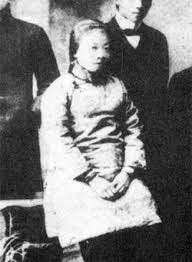"On the Question of Women's Liberation" by He-Yin Zhen
Primer and guide questions for Bluestocking no. 3
Bluestocking session no. 3 will take place on April 23 (Sat.), 5-7 pm, over Zoom Interested participants may register here for the reading group discussion.
We will be taking up the article “On the Question of Women’s Liberation” by He-Yin Zhen, an anarchist-feminist who founded The Society for the Restoration of Women’s Rights. The anarchist group, based in Tokyo, published the journal Natural Justice (Tianyi) from 1907-1908, in which the article originally appeared. The article is anthologized in The Birth of Chinese Feminism: Essential Texts in Transnational Theory, ed. by Lydia H. Liu et. al.
He-Yin Zhen was a socialist, feminist, and anarchist revolutionary during the early 20th century. In 1907, she founded the journal Natural Justice (Tianyi Bao) with her husband, Liu Shipei in Tokyo, Japan. Despite Liu Shipeihaving conservative tendencies, the anarchist journal had very revolutionary undertones, often publishing on the plight of women, as well as arguing for their liberation. In He-Yin Zhen’s most famous work, entitled On the Question of Women’s Liberation, she declares that “the goal of equality cannot be achieved except through women’s liberation.” He-Yin Zhen had piercing insights which linked damaging capitalist ideals to the oppression of women. For instance, she claimed that the commodification of women harms men, too. We will find similar claims in the middle to late 20th century French feminism, but He-Yin Zhen has ahead of her time in this regard. She argued that the “equality” between men and women purported by liberal societies of the West were a sham, precisely because they are still in the bondage of power and privilege, which are still dominantly held by men. She anticipated, moreover, what we now call “virtue-signaling” by arguing that Asian men only pursue self-distinction by allowing women to be educated—or prohibiting the practice of foot-binding. All the while, however, men still continue to treat women as property, blocking women from having any real voice or power in society. Now more than ever, He-Yin Zhen’s work, which highlights the uniqueness of the Chinese woman’s experience, remains relevant to women in the margins. It captures the “other” of liberal feminist discourse which, often to its own detriment, can remain entrapped in its own claims for universality.
The following are the guide questions for “On the Question of Women’s Liberation” prepared by our lead discussant, Dr. Christine Abigail Tan (Yale-NUS College):
What does women’s liberation consist of?
What is problematic about liberation that is led by men, even when power (to change things) mostly lies with men anyway? Are allies not important?
What’s wrong with Anglo-European “progressiveness”? What does race have to do with Chinese women? Can you relate this to your social experiences as a Filipina?
How is gender and class intertwined? How does capitalist society further the oppression of women? Is this true in the Filipino context?
Why did He believe that feminist struggle should not be subordinate to class struggle, and that it was feminism which could bring about total social revolution (including the abolition of state and private property)? Do you think this is plausible?



